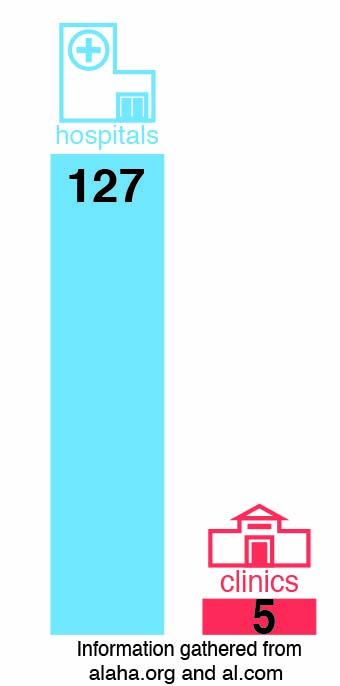-
Abortion is a right
Abortion is a right
ILLUSTRATIONS BY JOHN HILLER/STAFF ILLUSTRATOR

Katie Kyle
Opinion Columnist
katiek11@uab.edu
Alabama has a distinct history of violence when it comes to abortion. In 1993, an anti-abortion activist shot and killed Alabama physician David Gunn, M.D., who became the first doctor in the nation to be murdered for performing abortions. Twenty years ago, Birmingham was the site of the first fatal bombing of an abortion clinic in the United States, in which an off-duty police officer was killed and a nurse critically injured.
For many women, obtaining an abortion in Alabama may be more difficult than imagined, as state legislation continues to restrict the practice in an attempt to limit access. In 2001, there were twelve abortion clinics in the state of Alabama. Due to excessive restrictions, the number has dwindled over the years, and today, there are only five facilities in Alabama that perform abortions. They are located in Tuscaloosa, Huntsville, Montgomery, Birmingham and Mobile.
Guttmacher Institute found that 93 percent of Alabama counties had no clinics in 2017, resulting in diminished access for the 59 percent of Alabama women that live there. Alabama has tried several times to limit access to abortion by placing severe restrictions on clinics and physicians. For example, the Women’s Health and Safety Act of 2013 required physicians to have admitting privileges at a hospital in the same “metropolitan statistical area” as the clinic.
The requirement would have shut down the only abortion clinics in Montgomery, Mobile and Birmingham. A federal judge struck down the legislation in 2014 on the grounds that it was unconstitutional and imposed an “undue burden” on women seeking abortion services. The law also stated that abortion facilities located within 2,000 feet of a public K-8 school were not eligible to receive a license or renew an existing license.
The bill was intended to close the Tuscaloosa and Huntsville locations, which performed more than half of the abortions in the state in 2014, according to the Alabama Department of Public Health. These targeted restrictions on abortion providers, often referred to as TRAP laws, are medically unnecessary.
According to the Committee on Health Care for Underserved Women of the American College of Obstetricians and Gynecologists (ACOG), “legislative restrictions fundamentally interfere with the patient-provider relationship and decrease access to abortion for all women, and particularly for low-income women and those living long distances from health care providers.” But Alabama lawmakers continue to interfere with women’s fundamental right to access abortion, which was guaranteed by the Supreme Court’s ruling in Roe v. Wade in 1973. Last November, Alabama amended its constitution by passing Amendment 2, which was supported by 59 percent of voters, according to Ballotpedia.
The Amendment sent a clear message: Alabama’s state policy is to “recognize and support the sanctity of unborn life and the rights of unborn children, including the right to life.” It also states that the law does not recognize a right to an abortion or require funding of abortions. In 2014, the mandatory waiting period to receive an abortion was increased from 24 to 48 hours. One bill proposed to ban abortions if a fetal heartbeat is detected, which can occur as early as six weeks, but was fortunately struck down.
This interference is outrageous and needs to stop. Morally, individuals have the right to reach their own conclusions about the practice of abortion. But religious and moral objections do not change the law. Legally, the issue is very plain. Abortion is a fundamental right afforded by the Constitution, and the personal views of Alabama lawmakers should not dictate women’s access to abortion services. -
abortion opinion
House Bill 314 is taking us to $0

Caleb Wood
Opinion Columnist
calwood@uab.eduIf the Alabama state government is good at one thing, it’s grandstanding. House Bill 314, the trainwreck of an abortion bill that just rolled out of the capitol is a perfect example of that.
As it stands, legislators in our state have passed a bill that would apply a penalty to performing an abortion equal to murder. The bill is deliberately unconstitutional. Republicans know this. They didn’t write this bill for it to go into effect.
This bill is not going to take effect for a long time, if ever. The only way it could is if Roe v. Wadeis overturned. That is an extremely unlikely thing to happen. What is guaranteed, though, are lawsuits.
While the bill is aimed at hurting pregnant women, the side effects of its passage can damage many people who have no stake in the issue whatsoever.
The state is going to spend millions and millions of dollars on lawsuits. Alabama is no stranger fighting quixotic crusades against basic human rights. They have paid nearly four million dollars to the ACLU on them since 2013 alone. That is money that could be spent on teachers, healthcare, prisons, or one of the many other desperately underfunded aspects of our government.
Republicans do not care about the cost. They voted down an amendment by Sen. Vivian Davis Figures that would have required members of the legislature to pay for legal fees. They are going to push ahead with this issue no matter how it hurts those in the state.
Furthermore, it is eating up time that lawmakers could be using to work on legislation that would have some benefit for the state. The State Senate spent over four hours debating this bill. That time would have been of far better use if they had spent it on finding ways to cover the $35 million Children’s Health Insurance Program (CHIP) shortfall.
It has already damaged our reputation. Like clockwork, articles are coming out denouncing the actions taken by our government. In our neighbor Georgia, the passage of a similar bill this month has already led five production companies to announce they will no longer film in the state. For Alabama’s small but growing film industry and the jobs it provides, that could be a death sentence.
House Bill 314 is so unconstitutional that it may never take effect. It will still damage our state in other ways. It will put a drain on our reputation, funds, and legislative time that we can never get back. It already has.